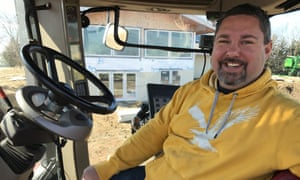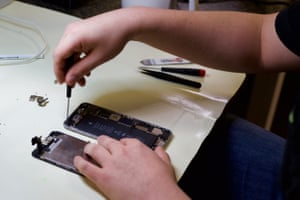Finanzmarkt- und Konzernmacht-Zeitalter der Plutokratie unterstützt von der Mediakratie in den Lobbykraturen der Geld-regiert-Regierungen in Europa, Innsbruck am 03.05.2017
Liebe® Blogleser_in,
Bewusstheit, Liebe und Friede sei mit uns allen und ein gesundes sinnerfülltes Leben wünsch ich ebenfalls.
Aus dieser Quelle zur weiteren Verbreitung entnommen: Andrea Drescher
ein bißchen „verschwörungstheorie“ zum feiertag.
wir werden das recht an unserem eigentum verlieren … nach und nach. den konzernen wird alles gehören …
klingt wild? in den USA sind sie auf dem weg. die bauern verlieren das recht, ihre traktoren selbst zu reparieren!
aus dem artikel:
John Deere has gone as far as to claim that farmers don’t own the tractors they pay hundreds of thousands of dollars for, but instead receive a “license to operate the vehicle”.
john deere geht so weit zu sagen, dass die farmer ihre traktoren, für die sie 100000nde dollar gezahlt haben besitzen. sie haben nur eine „lizenz für den betrieb erhalten“.
die quellen sind hoffentlich „seriös genug“ – in D oder A liest man das leider noch nicht.
https://www.theguardian.com/…/nebraska-farmers-right-to-rep…
https://www.forbes.com/…/john-deeres-digital-transformatio…/
http://modernfarmer.com/2016/07/right-to-repair/
wer das für uninteressant hält … darf gerne weiterschlafen.
übrigens: demnächst wird es die meiste software auch nur noch als lizenz geben. dann betrifft es JEDEN.
https://www.theguardian.com/environment/2017/mar/06/nebraska-farmers-right-to-repair-john-deere-apple

There are corn and soy fields as far as the eye can see around Kyle Schwarting’s home in Ceresco, Nebraska. The 36-year-old farmer lives on a small plot of land peppered with large agricultural machines including tractors, planters and a combine harvester.
Parked up in front of his house is a bright red 27-ton Case tractor which has tracks instead of wheels. It’s worth about $250,000, and there’s a problem with it: an in-cab alarm sounds at ten-minute intervals to alert him to a faulty hydraulic connector he never needs to use.
Because farm machinery is now so high-tech, the only way to silence the error message is by plugging in a special diagnostic tool – essentially a computer loaded with troubleshooting software that connects to a port inside the tractor – to identify and resolve the problem. Only manufacturers and authorized dealers are allowed that tool, and they charge hundreds of dollars in call-out fees to use it. For a fifth-generation farmer in an increasingly squeezed industry, whose family has spent decades fixing the equipment they paid for, it’s a tough pill to swallow. He’s coped with the intermittent alarm sound for almost a year.

“I can’t turn the alarm off. If I had the literature and capability to diagnose and fix it, it would already be done. I changed the mechanical switch and wire, but now I’m down to the programming,” he said Wednesday.
Kyle is one of many farmers in the US fighting for the right to repair their equipment. He and others are getting behind Nebraska’s “Fair Repair” bill, which would require companies to provide consumers and independent repair shops access to service manuals, diagnostic tools and parts so they aren’t limited to a single supplier. They have an unlikely ally: repair shops for electronic items like iPhones, tablets and laptops who struggle to find official components and information to fix broken devices. This means the bill could benefit not just farmers but anyone who owns electronic goods. There’s also a benefit to the environment, as it would allow for more refurbishment and recycling instead of sending equipment to the landfill.
Nebraska is one of eight states in the US – including Minnesota, New York, Massachusetts, Illinois, Wyoming, Tennessee and Kansas – seeking to pass “right to repair” legislation. All eyes will be on the Cornhusker state when the bill has its public hearing on 9 March, because its unique “unicameral legislature” (it’s the only state to have a single parliamentary chamber) means laws can be enacted swiftly. If this bill, officially named LB67, gets through, it may lead to a domino effect through the rest of the US, as happened with a similar battle over the right to repair cars. These Nebraska farmers are fighting for all of us.
Big agriculture and big tech – including John Deere, Appleand AT&T – are lobbying hard against the bill, and have sent representatives to the Capitol in Lincoln, Nebraska, to spend hours talking to senators, citing safety, security and intellectual property concerns.
John Deere has gone as far as to claim that farmers don’t own the tractors they pay hundreds of thousands of dollars for, but instead receive a “license to operate the vehicle”. They lock users into license agreements that forbid them from even looking at the software running the tractor or the signals it generates.
Squaring up to the corporates are grassroots activists like Kevin Kenney, 52, who has spent months educating fellow farmers and pounding the corridors of the Capitol building to counter the lobbyists’ fear-mongering.
Kenney argues farmers are in effect being held to ransom when their machinery breaks down. “Before software, there wasn’t anything you couldn’t work on. It was all book and tools. Now it’s book and tools and software,” he said. Opening up the equipment will allow Nebraska’s farmers to expand their skills into computer science, allowing for ag-tech innovation in “Silicon Prairie”.
The combination of the agricultural repair with electronic goods repair makes Kenney nervous: he thinks it’s going to be a harder fight with the attention and lobbying clout of technology giants. “Apple is going to throw too much money at it,” he said.

State senator Lydia Brasch, who sponsored the bill, described a meeting with the Apple lobbyist Steve Kester. “Apple said we would be the only state that would pass this, and that we would become the mecca for bad actors,” she said. The Cupertino-headquartered company also argued there was a safety risk associated having untrained people installing unofficial components, particularly lithium ion batteries – as demonstrated by Samsung’s Note 7 debacle. Apple also told Brasch that there were plenty of authorized repair shops to choose from.
The state of Nebraska, which covers 77,000 sq miles (roughly the size of England and Scotland combined), has just one Apple Store. It’s an 80-mile journey for Brasch to get there, and it can take weeks to get a Genius Bar appointment. “It’s disruptive and inconvenient,” she said. It’s the same for authorized repair shops of agricultural equipment. Long waits for engineers can lead to costly downtime at critical weather-sensitive parts in the farming cycle, such as planting or harvesting.
Brasch, who works as a software consultant and is married to a farmer, said that in her seven years in office, she had never experienced lobbying like it – even when she introduced a pro-life bill, which she recognizes is a “controversial issue”.

Jason DeWater, 36, is a former principal horn at the Omaha symphony orchestra. He founded a chain of repair shops in the city, called iFixOmaha. He and a team of skilled technicians repair smartphones – mostly iPhones – as well as tablets and laptops.
He scoffs at the idea that independent repair shops are somehow unsafe; his staff go through several months of OSHA-certified training before they can even touch a customer’s phone.
“We take full liability for our customers’ devices. If we make a mistake, we buy them a replacement device. In addition, our products are backed with a lifetime warranty,” he said. “Apple can’t even say that.”
Not having official diagnostic and disassembly tools makes their job difficult, particularly as companies such as HTC design their products to make them tricky to even open without specific proprietary tools.

He even went as far as contacting Apple to ask about the authorization process, but the company then looked at his website and told him he was engaged in “fraudulent activity”. By signing up with Apple he would not be permitted to mention any other smartphone manufacturer on his website nor would he be allowed to replace modular parts or remove screens. Instead, he’d have to send devices to an Apple service center, leaving customers without them for weeks instead of hours.
“If we signed up, they would dictate the pricing and terms of service. We’d end up being a post office for Apple,” DeWater said. All he wants is the the ability to buy official components from Apple and others and the diagnostic software.
“We’re not looking to access personal data. We’re certainly not trying to reverse-engineer Apple’s products. All we’re trying to do is fix customers’ devices.”

Apple declined to comment, but emphasized that using authorized channels was the only way to ensure a user was getting genuine Apple parts and that the repair was done to the right specifications.
John Deere declined to be interviewed but sent a lengthy statement outlining its concerns. The company doesn’t want people altering its copyright-protected code because, said director of public relations Ken Golden, “changes could lead to the unsafe operation of products, disruption of machine capabilities and performance, changes to emissions controls, voiding of warranties and lack of transparency to the changes when the equipment is sold to another user”.
Despite the intense lobbying, farmers, electronic repair shops and state senators remain largely united, and frame the issue as one of corporate greed.
“They see someone trying to share the sandbox and they don’t want anybody else to play in it,” said Brasch.
“In my view, that’s not how our country was built. We are all about free enterprise and competition. That’s what makes us strong.”
——————————————————————————————————————————————-
Aus dem per ÖVP-Amtsmissbräuche offenkundig verfassungswidrig agrar-ausgeraubten Tirol, vom friedlichen Widerstand, Klaus Schreiner
Don´t be part of the problem! Be part of the solution. Sei dabei! Gemeinsam sind wir stark und verändern unsere Welt! Wir sind die 99 %!
“Wer behauptet, man braucht keine Privatsphäre, weil man nichts zu verbergen hat, kann gleich sagen man braucht keine Redefreiheit weil man nichts zu sagen hat.“ Edward Snowden


Hier noch eine kurzes Video zur Erklärung der Grafik Gewaltspirale der US-Kriege
https://www.youtube.com/watch?v=1PnxD9Z7DBs


Bitte teile diesen Beitrag:

